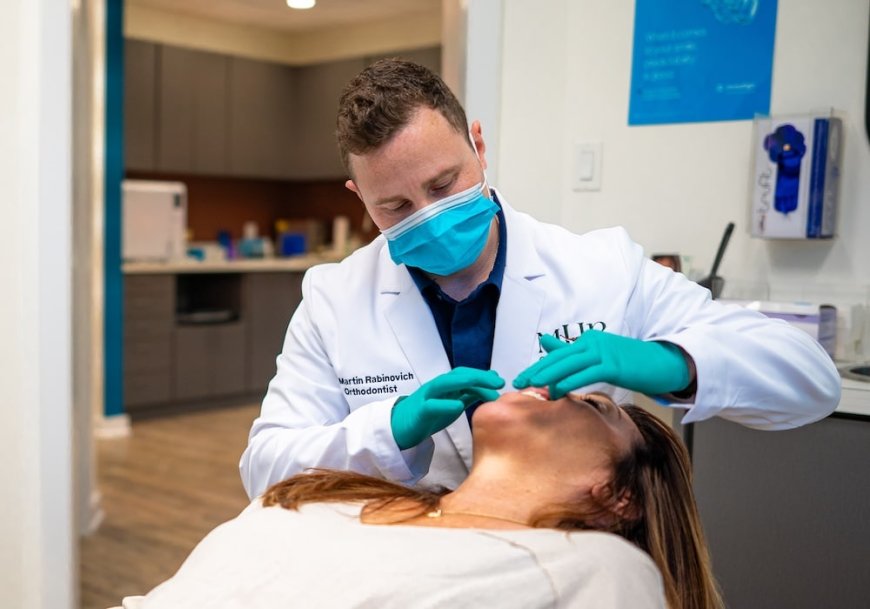5 Questions to Ask Your Orthodontist Before Starting Treatment
Before starting orthodontic treatment, it's important to ask the right questions to ensure you’re fully informed.

Starting orthodontic treatment is a big decision that can impact your oral health and appearance for years to come. If you're considering braces or clear aligners, it’s important to ask the right questions before committing to any treatment plan. If you're looking for expert care, Orthodontists in Dubai offer a range of options designed to cater to your unique needs. This guide will highlight the top 5 questions you should ask your orthodontist to ensure you're making the best decision for your smile.
1. What Treatment Options Are Best for Me?:
One of the first questions to ask your orthodontist is about the treatment options available for your specific dental needs. There are various methods for straightening teeth, and understanding which option will work best for you is crucial.
Braces or Clear Aligners:
- Traditional Braces: These are often the go-to option for more complex dental issues, offering precise control over tooth movement.
- Clear Aligners: If you're looking for a more discreet option, clear aligners like Invisalign or ClearCorrect may be suitable, especially for mild to moderate alignment issues.
- Other Alternatives: Ask your orthodontist about other available treatments such as lingual braces or ceramic braces, which offer aesthetic benefits while providing strong tooth control.
Factors to Consider:
- Severity of Your Condition: If you have a more complex case, braces may be the best option, but clear aligners can be perfect for simpler issues.
- Aesthetic Preferences: Clear aligners are discreet, while metal braces are more noticeable but highly effective for major realignment.
- Treatment Duration: Clear aligners often offer faster results than traditional braces, but this can vary based on your specific case.
2. How Long Will My Treatment Take?:
Understanding the time commitment involved in orthodontic treatment is important for setting expectations and planning your schedule. The duration of treatment depends on several factors, including the severity of your condition and the type of treatment selected.
Typical Treatment Times:
- Braces: On average, treatment with braces can take anywhere from 18 months to 3 years, depending on the complexity of the case.
- Clear Aligners: Aligners generally take 12 to 18 months, but this can vary depending on how diligently you wear them.
- Early Treatment: If you're seeking early intervention, such as for a child, treatments may take less time but may require additional phases as the child grows.
Factors that Impact Duration:
- Type of Alignment Issue: Severe misalignments may require longer treatment times.
- Compliance: For clear aligners, wearing the aligners as recommended is essential for achieving the desired results within the estimated time frame.
- Frequency of Appointments: How often you visit your orthodontist for adjustments can impact the duration of your treatment.
3. What Are the Costs Involved?:
Orthodontic treatment can be a significant investment, so it’s important to understand the financial implications before starting. Treatment costs vary widely depending on the type of braces or aligners, the complexity of the case, and the length of treatment.
What to Ask About Costs:
- Price Breakdown: Request a detailed breakdown of costs, including consultation fees, treatment fees, and follow-up visits.
- Insurance Coverage: Check with your orthodontist to see if the treatment is covered by your dental insurance. Many plans offer partial coverage for orthodontic care.
- Payment Plans: Ask about flexible payment options or financing plans to make treatment more affordable.
Average Cost of Treatment:
- Braces: The cost of traditional metal braces can range from AED 7,000 to AED 15,000 depending on the treatment’s complexity.
- Clear Aligners: Clear aligners tend to be a bit more expensive, often ranging from AED 10,000 to AED 18,000, depending on the provider and the duration of treatment.
4. What Will My Aftercare and Retainer Options Be?:
Once your braces or aligners are removed, maintaining your smile is key to ensuring long-term results. Retainers play a crucial role in preventing teeth from shifting back into their previous positions.
Questions to Ask About Aftercare:
- Retainers: Will you be required to wear retainers after the treatment, and if so, for how long each day? Retainers are typically worn full-time initially, and then part-time in the long term.
- Maintenance: How often will you need to return for check-ups after your treatment is complete? Some orthodontists recommend a follow-up every 6 months to ensure that the teeth remain properly aligned.
- Oral Hygiene: Ask for tips on maintaining good oral hygiene with your new smile, especially if you have permanent retainers or special instructions for aftercare.
Types of Retainers:
- Removable Retainers: These can be taken out when eating or brushing teeth and are generally more comfortable but require consistent use.
- Fixed Retainers: These are attached to the back of the teeth and offer the convenience of not having to remember to wear them. They are often recommended for long-term maintenance.
5. What Are the Risks and Potential Discomforts?:
Every treatment comes with its own set of potential risks and discomforts. Understanding these beforehand will help you make an informed decision about whether orthodontic treatment is right for you.
Potential Risks and Discomforts:
- Discomfort with Braces: Braces can cause some initial discomfort as the teeth begin to shift. There might also be irritation to the inside of the mouth from brackets or wires.
- Clear Aligners: While clear aligners are generally more comfortable, they require consistent wear, and failure to do so can result in slower progress.
- Potential Side Effects: In rare cases, patients may experience gum irritation, tooth sensitivity, or root resorption. Discuss these concerns with your orthodontist before treatment begins.
Managing Discomfort:
- Pain Relief: Over-the-counter pain relievers can often help with any discomfort during the initial adjustment period.
- Mouth Sores: Wax for braces can help prevent irritation inside the mouth, and aligner trays can sometimes be adjusted to alleviate discomfort.
Conclusion:
Choosing the right orthodontist and treatment plan is a critical step toward achieving a beautiful, healthy smile. By asking these important questions, you can ensure that you make a well-informed decision about your treatment. Orthodontists in Dubai offer a wide variety of options, from traditional braces to clear aligners, to cater to your unique needs. Take the time to discuss your goals, treatment options, and financial concerns with your orthodontist to set yourself up for success. A well-planned treatment journey can lead to a confident smile that lasts a lifetime.
What's Your Reaction?


























